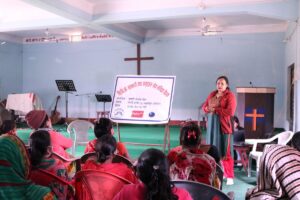 Sharada Gayak from Chitwan, Madi Municipality used to feel tough to talk to new people until a few years back. Mostly Chepang and Dalit dwell in her area. Almost all women would hesitate talking to new people, it would be more difficult for them to put their voice in front of somebody. Sharada narrates, “Earlier, for women, it used to be difficult not only to talk to other people, rather, they also would hesitate to come out of their home.” Local women were busy with their own household (mélápát) stuff. As Sharada told, the income of women was limited to the household chore that was not counted as income-generating work.
Sharada Gayak from Chitwan, Madi Municipality used to feel tough to talk to new people until a few years back. Mostly Chepang and Dalit dwell in her area. Almost all women would hesitate talking to new people, it would be more difficult for them to put their voice in front of somebody. Sharada narrates, “Earlier, for women, it used to be difficult not only to talk to other people, rather, they also would hesitate to come out of their home.” Local women were busy with their own household (mélápát) stuff. As Sharada told, the income of women was limited to the household chore that was not counted as income-generating work.
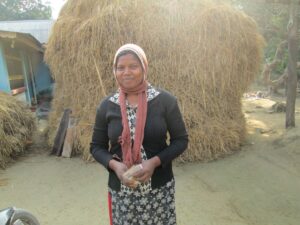
The condition was same in case of women from Dalit community residing in Sarlahi Haripur-8 Jutpani. It was an audacity for those Dalit women to come out from home and speak in public. No one would prefer listening to women who speak on social, political and policy issues. Malati Karna, a local resident, would not feel like speaking in public because of a kind of fear. She shared, “Women’s voices would not come out. In case someone would dare, they would yell— females should not speak!”
Paramdevi Majhi, a resident from Sarlahi 5 Masuhar tole, shares similar experiences with that of Malati. Paramdevi was also raised in the community which would not allow women to speak. So, she would not speak at all. Though she would speak sometimes with all her guts, no one would listen to her. Paramdevi said, “When a woman would speak, they would say pothi báseko rámro hudaina (it would bring bad luck when a woman speaks). So, we would lay ourselves inside ghumto.”
Lily Mardi from Morangg Kanepokharii Rural Municipality-1, shares similar experiences that match Sharada and Malati’s. Though she is a +2 graduate, she does not feel comfortable speaking in public. She shared, “Whatever educated women are, our community believes women should shut up.” She never saw women speaking in government offices, programs organised by social organisations or public discussions held around. Not only this, she says, “Male would hover inside the home also in the decision-making process. Women could never speak.”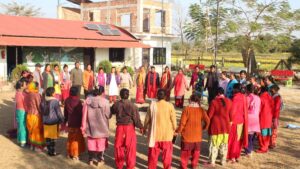
Lily developed her skills and became a staff member as a social-mobiliser at Samari Utthan Sewa (SUS). She is also an executive committee member at Pratibaddha Mahila Utthan Samaj, Morangg. This organisation is also a Community-Based Organisation (CBO) of Self-Help Groups (SHGs) formed under SUS’s projects.
Dalit and women from underprivileged community of Chitwan, Sarlahi, and Morangg carry common stories who lack self-confidence, who have listened that women should not speak up and put their voice in policy making process. Such narratives have been changing a bit now. Women from SUS’s project coverage area now have been developing their skills of leadership. Their involvement in skill development training, discussing in self-help groups, income generating skills, decision making at home, discussion of social and political issues with their views, going to government and other offices and put forward their views; these things have been increasing women’s ability to speak up and build their personality. For Dalits who are again underprivileged within their own community, the prioritising thing is to develop their own confidence.
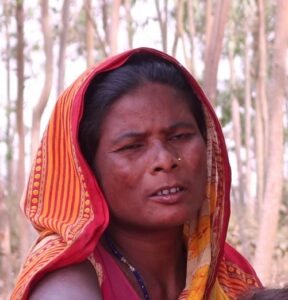
“Many organisations came and worked in our village. But it is SUS only that organised local women and encouraged them to form SHGs”, said Tara. SHG’s members got the opportunity to participate in leadership development programs. They celebrated Women’s Day, Bál Diwas within their group. SUS also provided training to grow vegetables, sewing skills and animal husbandry. This resulted in their confidence build-up in engagement in income generation. Sharada also participated in various training programmes organized by SUS for e.g., vegetable farming training, legal training, leadership development training, organisational development training. She said, “I used to be scared to speak. However, by now, I have been able to speak whatever I feel in the place needed. Surprisingly, now I also have been able to resolve conflict between people at local level.”
Not only Sharada, but the changes have occurred in the case of her neighbor Tara Sunar also. After getting connected to SUS, she acquired skill development training and developed leadership capacity. This has changed many things in her life and the family also benefited from the same. She said, “I used to work hard in household chores only. Now I know, if we work hard with smart effort, this helps to generate income in a proper way. There is a kind of happiness when you have money in your hand, you can speak confidently to people. I knew this thing once I got training from SUS”.
Tara used to buy vegetables from the market. Now she has grown vegetables in her own land so she cooks fresh vegetables. She got vegetable farming training from SUS then started growing vegetables in a tunnel. Now, Tara is growing cabbage, tomato and cauliflower in 3 tunnels. She said, “I used to face difficulties in getting some gifts when I went to neighbors as I could not have money in my pocket. Now, I can take the vegetables I grow in my farm as the best offering to my neighbor. This also makes them happy.”
Tara used to seal herself up inside home, she could not speak in public. But now, she goes to sell her vegetables by riding a bicycle. She said, “I was a bit shy in doing this but later on it became a habit. By now, I feel proud to do my own work.”
She used to get afraid unnecessarily. She could not read and write because of illiteracy. She had an inferiority complex in front of others. But, once SUS organised the local women and arranged for informal literacy classes for old-age people, she also joined the class in the evening after finishing the household chores. During initial days of literacy classes, she felt awkward to see the letters and words. Gradually, she started to learn, read and write. She shared, “By now I have been able to read and write. I can sign instead of doing a fingerprint.”
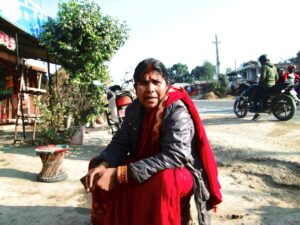
She earned the capacity of public speaking, putting views in front of people, discussing with friends and collecting advice in various matters. Because of such capacity she, for 7 years, chaired the Madi Utthan Mahila Samaj, a CBO formed by the SHGs formed under SUS’s project in Chitwan project site. Society would dislike listening to women, but now, people have already started to listen to Tara’s voice.
Once she became chair of the group, she started to find the reasons behind the violence in the community. She also fought for ensuring justice to the victims of early marriages. She learned that a woman from her community is devoid of having citizenship. Tara devoted herself to help her getting citizenship. After visiting local leaders, police, and the ward office she was successful in the task. When she knew that the victim’s home was in Gulmi, she rushed there and helped her get citizenship.
Tara started to lead the SHG, she knew how fragile her personality was. She did not have anything in the name of fixed assets. All of the land was registered to her husband’s name. In his anger, the husband would say, “You have nothing as your own.” She would feel sad listening to the insult. She could not do anything at that time. Once she joined SUS and developed leadership skills, she started to earn on her own. This also developed confidence. She successfully bought pieces of land in two places. This was the result of her own capacity. She felt proud and said, “Those lands are registered in my name.”
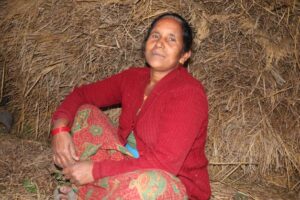
Malati Karna from Sarlahi had her flabbergasting bygone days. She feels awakening to see women changing, who, in the past, could not speak, did not have sources of income and skills, used to face domestic violence. Once SUS formed a SHG in her community and started to train them with various skills e.g., leadership skills, income generating skills, awareness on Human Rights; the personality of local women was developed and they gained confidence in speaking and making their voice heard. Malati too could not speak in public, earlier. Once she started to attend SHG’s meeting, she listened to her friends, put her own voice in the group. Then many people started to know her identity. She feels that there is somebody who would listen to her. She narrates, “Now I can speak whenever I feel urgent. I have already learned how to speak in what context so that people would listen to me.”
Malati was the chair of Namuna Woman’s Group, a SHG formed under SUS’s project in Sarlahi project site. This developed her capacity to lead the group and listen to other voices. During her engagement in the group, she learnt the way to speak so that it could be influential. She also knew that when a woman goes to the government offices to solve the problems of society, it would matter a lot. In a local school named Nawa Jiwan Bidhya Ashram a Musahar student was beaten by the school teacher and insulted him for his caste. Malati went to the authorities and put her voice on behalf of the community. She narrated, “If I had not put the views on behalf of Musahar parents, this incident would have been suppressed.” Once she expressed her views, the school administration agreed to give medical treatment to the student and promised that such an incident would not repeat in future.
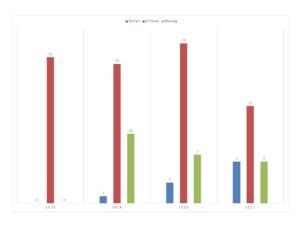
By now Malati feels that getting to speak is also a human right. She tries to share this understanding with others also. Malati’s capacity to speak in public made her a district working committee member of National Land Rights Forum. Because of her ability to speak, she is a known face in her community, people in the community listen to her. So, local political leaders have asked her for candidacy in the upcoming local election.
Param Devi Majhi is from the one of the lowest categories of Dalit, under Musahar community. She has developed skills and confidence in speaking in the public because of SUS. SUS has economically supported her community in rearing boar (pig), starting saving a few amounts in a group. This has increased her confidence. Once SUS taught her about human rights, she has learned that speaking is also a part of human rights. Now, she is able to speak not only for herself rather for needy people in the community. Whenever some women face domestic violence or somebody becomes ill, she readily becomes helpful. Now she is trying to register a group-based boar rearing farm initiated jointly by Laxmi Woman’s Group and Janaki Woman’s Group, a local SHG formed under SUS’s project, whereas 10 members from Laxmi and 11 from Janaki are involved. She said, “Whenever I am able to speak, I already know to claim my rights. I already know about the government’s support for some matters and how we can get those support.”
“I used to work hard in household chores only. Now, I know, if we work hard with smart effort, this helps generate income in a proper way. There is a kind of happiness when you have money in your hand, you can speak confidently to people. I knew this thing once I got training from SUS”.
– Tara Sunar, Former Chair, Madi Mahila Utthan Samaj, Chitwan
Lily’s engagement in several trainings organized by SUS’s taught her to come out from home, speak in public and gave ideas to deal for community welfare. She participated in a social mobiliser training provided by SUS and not only knew various problems of her community but also how people from the community are deprived of various rights. She also knew that people are in need of solving their problems from the right platform. She developed skills of putting her voice as a local community facilitator via SUS. Moreover, she gained confidence to lead her community. Once she became secretary of locally established CBO, named Pratibaddha Mahila Utthan Samaj, she learned ideas to develop a common voice together.
She said, “Women who are associated with a SHG and CBOs, they are now able to put their voice in concerned places. They are now able to visit ward office/rural municipality office or district administrative office and put their own voice and work for themselves.” The locals have not only understood the importance of personal documents and its importance like, making birth/citizenship/marriage/death certificate. So, they are now able to make these documents with their own effort. Earlier, having the majority of Santhal group in her community, there were no locals engaged in social organisations and government-related committees. She said, “Now, some are engaged in the school management committee and some have been members of political parties.”
Lily thinks, if the SUS had not come into her village, she would have been engaged in merely household chores. Through her engagement in various programmes offered by SUS, she saw her path. In society it was strange for women to ride in male’s cycle/motorcycle and go somewhere alone. But these taboos did not remain a taboo in her case. She said, “people used to backbite when they see me walking with some new person. Now, they are tired of backbiting. I did not give up what I had to do.”








Discussion about this post